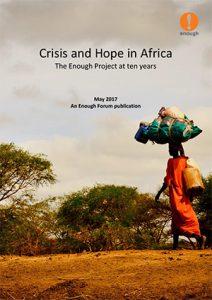Click here to read the full paper.
 This Enough Forum paper, “Crisis and Hope in Africa: The Enough Project at Ten Years,” by Colin Thomas-Jensen is published as part of the Enough Project’s 10th Anniversary Commemoration Week.
This Enough Forum paper, “Crisis and Hope in Africa: The Enough Project at Ten Years,” by Colin Thomas-Jensen is published as part of the Enough Project’s 10th Anniversary Commemoration Week.
In late 2006, I spent a weekend at a hotel in downtown Philadelphia with an extraordinary group of human rights activists. The meeting, convened by the Bay Area-based foundation Humanity United, was the first step toward building a new organization—one that would use field-based research and analysis of armed conflict and focused advocacy to generate greater political will in the United States and elsewhere to take bold policy decisions to end genocide and mass atrocities in Africa. Three years earlier, the Government of Sudan had begun a military campaign against its citizens in Darfur. The atrocities were met with widespread global condemnation and launched the Save Darfur Coalition, a major grassroots movement focused on ending the killing, which the George W. Bush administration called genocide. Our goal in Philadelphia was ambitious, borne not just from a collective sense of outrage over the brutality of conflicts at the time across East and Central Africa, but also from the belief that the strong bipartisan constituency built around ending genocide in Darfur could be a game-changer in affecting policy change on a broader agenda.
More than 10 years on, I am proud to say that meeting’s result—the Enough Project—is an established and important voice on human rights and atrocity prevention. Enough’s work continues to impact the international response to atrocities and affects positive change where it matters most: in countries and communities where extreme violence and human rights abuses are most acute. In a time of both increased grassroots activism in the United States and discouraging signs that the United States is retreating from an international leadership role in responding when civilians are targeted en masse by governments or armed groups, Enough’s mission is as relevant and even more vital now than it was at its founding in Spring 2007…
Click here to read the full paper.

